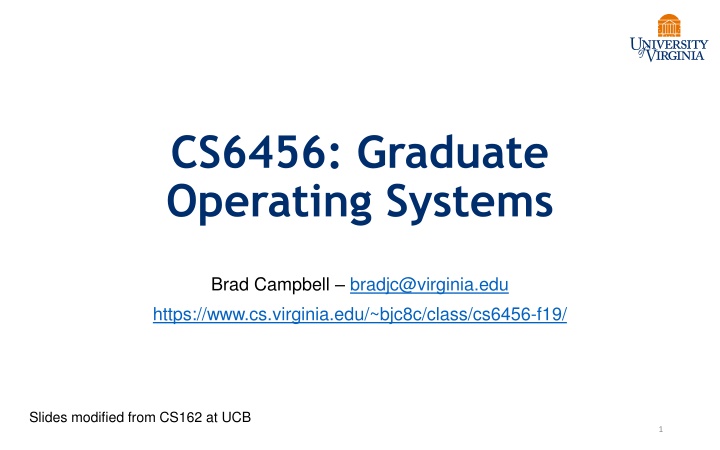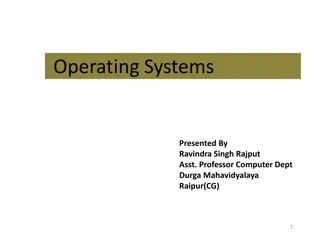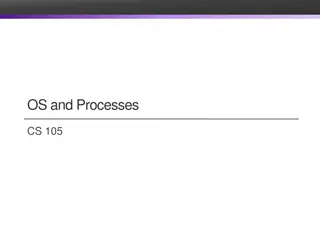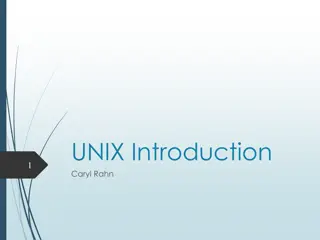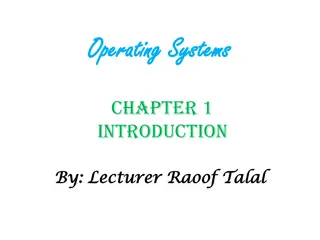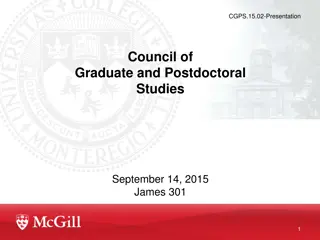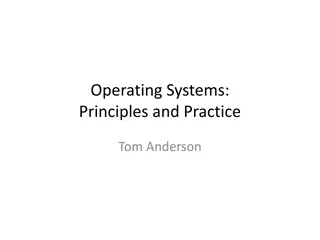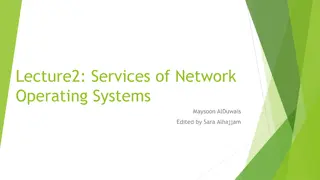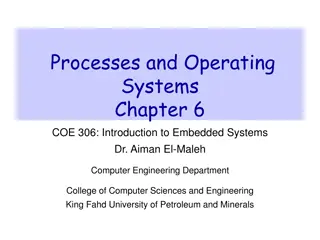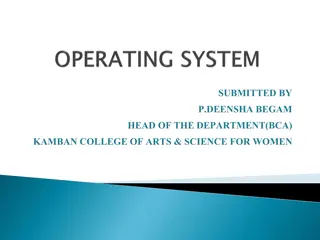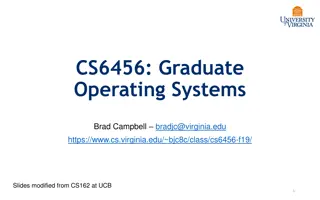Graduate Operating Systems by Brad Campbell
This document covers various topics related to graduate operating systems, including binding instructions to memory, executing program instances, and decision-making on memory addresses at compile, load, and run times. It explores the complexities and challenges associated with memory management and address handling in operating systems."
Download Presentation

Please find below an Image/Link to download the presentation.
The content on the website is provided AS IS for your information and personal use only. It may not be sold, licensed, or shared on other websites without obtaining consent from the author.If you encounter any issues during the download, it is possible that the publisher has removed the file from their server.
You are allowed to download the files provided on this website for personal or commercial use, subject to the condition that they are used lawfully. All files are the property of their respective owners.
The content on the website is provided AS IS for your information and personal use only. It may not be sold, licensed, or shared on other websites without obtaining consent from the author.
E N D
Presentation Transcript
CS6456: Graduate Operating Systems Brad Campbell bradjc@virginia.edu https://www.cs.virginia.edu/~bjc8c/class/cs6456-f19/ Slides modified from CS162 at UCB 1
Binding Instructions and Data to Memory Process view of memory Physical addresses data1: start: loop: checkit: dw lw 32 r1,0(data1) 0x0300 0x0900 0x0904 0x0908 0x090C 0x0A00 00000020 8C2000C0 0C000280 2021FFFF 14200242 jal addi r1, r1, -1 bnz r1, loop checkit
Binding Instructions and Data to Memory Physical Memory 0x0000 0x0300 00000020 Process view of memory Physical addresses 0x0900 8C2000C0 0C000340 2021FFFF 14200242 data1: start: loop: checkit: dw lw 32 r1,0(data1) 0x0300 0x0900 0x0904 0x0908 0x090C 0x0A00 00000020 8C2000C0 0C000280 2021FFFF 14200242 jal addi r1, r1, -1 bnz r1, loop checkit 0xFFFF
Execute Second Instance of Program? Physical Memory 0x0000 0x0300 Process view of memory Physical addresses App X 0x0900 ? data1: start: loop: checkit: dw lw 32 r1,0(data1) 0x0300 0x0900 0x0904 0x0908 0x090C 0x0A00 00000020 8C2000C0 0C000280 2021FFFF 14200242 jal addi r1, r1, -1 bnz r1, loop checkit 0xFFFF
Execute Second Instance of Program? Physical Memory 0x0000 0x0300 Process view of memory Physical addresses App X 0x0900 data1: start: loop: checkit: dw lw 32 r1,0(data1) 0x1300 0x1900 0x1904 0x1908 0x190C 0x1A00 00000020 8C2004C0 0C000680 2021FFFF 14200642 0x1300 00000020 jal addi r1, r1, -1 bnz r1, loop checkit 8C2004C0 0C000680 2021FFFF 14200642 0x1900 0xFFFF
When do we decide on addresses? At compile time? Tricky we don't know state of physical memory when program is executed At load time? Scan through binary and modify addresses Expensive what if we have a large program? Still using physical addresses directly At run time? Translation Modify addresses issued by CPU on the fly
Uniprogramming No translation No protection Application can access any physical address directly Application always runs at same location 0xFFFFFFFF Operating System Valid 32-bit Addresses Application 0x00000000 Not just illusion of dedicate machine, it really is a dedicated machine!
Primitive Multiprogramming No translation No protection Programs need to use different address ranges Rely on loader to modify addrs at execution time Common on early operating systems 0xFFFFFFFF Operating System 0x00020000 Application2 Application1 0x00000000
Multiprogramming with Protection 0xFFFFFFFF Operating System BoundAddr=0x10000 BaseAddr=0x20000 0x00020000 Application2 Application1 0x00000000 Hardware Support: Base and Bound Registers Access outside of range: Error! (Unless in Kernel Mode) Modify from kernel mode only Kernel loads register values from PCB when context switch occurs
Loading Executable Into Memory disk (huge) memory info data code exe View so far: OS copies each segment into memory Then set up registers, jump to start location
New View: Create Address Space disk (huge, TB) VAS per process kernel stack stack heap heap data data code One (very conservative) method: Every page in address space is backed by disk Just allocate space on disk, let a page fault trigger a load into memory
New View: Create Address Space disk (huge, TB) VAS per process kernel stack stack heap heap data data code Note that we do not need an extra copy of read-only data already contained in a file Executable code, memory mapped files (soon)
New View: Create Address Space disk (huge, TB) PT VAS per proc. memory kernel user page frames stack stack heap user pagetable heap data data kernel code & data code User page table maps entire virtual address space One per process, distinguishes present from absent pages OS needs to store mapping from virtual page to disk location
New View: Create Address Space disk (huge, TB) PT VAS per proc. memory kernel user page frames stack stack heap user pagetable heap data data kernel code & data code Backing Store Cache
Provide Backing Store for VAS disk (huge, TB) PT 1 VAS 1 memory kernel stack stack user page frame s user pagetable stack heap heap heap data PT 2 VAS 2 data code data code kernel kernel code & data stack heap data code
A Page Fault disk (huge, TB) PT 1 VAS 1 memory kernel stack stack user page frames stack heap heap heap data PT 2 VAS 2 data user pagetable code data code kernel kernel code & data stack heap active process & PT data code
A Page Fault: Find and Start Load disk (huge, TB) PT 1 VAS 1 memory kernel stack stack user page frames stack heap heap heap data PT 2 VAS 2 data user pagetable code data code kernel kernel code & data stack heap active process & PT data code
A Page Fault: Switch During IO disk (huge, TB) PT 1 VAS 1 memory kernel stack stack user page frame s user pagetable stack heap heap heap data PT 2 VAS 2 data code data code kernel kernel code & data stack heap active process & PT data code
On Page Fault: Update PTE disk (huge, TB) PT 1 VAS 1 memory kernel stack stack user page frames stack heap heap heap data PT 2 VAS 2 data user pagetable code data code kernel kernel code & data stack heap active process & PT data code
Eventually Reschedule Faulting Thread disk (huge, TB) PT 1 VAS 1 memory kernel stack stack user page frames stack heap heap heap data PT 2 VAS 2 data user pagetable code data code kernel kernel code & data stack heap active process & PT data code
File IO File IO so far: Explicit transfer between buffers in process address space to regions of a file Overhead: multiple copies in memory, syscalls Alternative: Map file directly into an empty region of a process address space Implicitly page in file when we read it Write to file and eventually page it out Executable file is treated this way when we execute a process!
Using Paging to mmapFiles Process physical address virtual address page# PT instruction MMU frame# offset page fault Read File contents from memory! retry exception Operating System Create PT entries for mapped region as backed by file Page Fault Handler File scheduler mmap() file to region of VAS
mmap system call May map specific region or let the system find one for you Tricky to know where a free region even would be
mmap Example #include <sys/mman.h> /* also stdio.h, stdlib.h, string.h, fcntl.h, unistd.h */ $ ./mmap test Data at: 105d63058 Heap at : 7f8a33c04b70 Stack at: 7fff59e9db10 mmap at : 105d97000 This is line one This is line two This is line three This is line four int something = 162; int main (int argc, char *argv[]) { int myfd; char *mfile; printf("Data at: %16lx\n", (longunsignedint) &something); printf("Heap at : %16lx\n", (longunsignedint) malloc(1)); printf("Stack at: %16lx\n", (longunsignedint) &mfile); /* Open the file */ myfd = open(argv[1], O_RDWR | O_CREAT); if (myfd < 0) { perror("open failed!");exit(1); } /* map the file */ mfile = mmap(0, 10000, PROT_READ|PROT_WRITE, MAP_FILE|MAP_SHARED, myfd, 0); if (mfile == MAP_FAILED) {perror("mmap failed"); exit(1);} $ cat test This is line one ThiLet's write over its line three This is line four printf("mmap at : %16lx\n", (longunsignedint) mfile); puts(mfile); strcpy(mfile+20,"Let's write over it"); close(myfd); return 0; }
Sharing through Mapped Files VAS 1 VAS 2 0x000 0x000 instructions instructions data data File heap heap Memory stack stack OS OS 0xFFF 0xFFF
32-bit x86 Linux Memory Layout Memory Mapped Files Extra stacks for multithreaded processes Shared Libraries Some Memory Allocations
32-bit x86 Linux Memory Layout ASLR: Address Space Layout Randomization Make it harder to exploit bugs to compromise system
32-bit x86 Linux Memory Layout Kernel mapped into every process's address space Protection bits: pages can't be accessed in user mode Why? Faster than changing address space on every switch to kernel mode
Linux Virtual memory map 0xFFFFFFFFFFFFFFFF 0xFFFFFFFF 128TiB Kernel Addresses Kernel Addresses 1GB 896MB Physical 64 TiB Physical 0xC0000000 0xFFFF800000000000 Empty Space Canonical Hole 3GB Total User Addresses 0x00007FFFFFFFFFFF 128TiB User Addresses 0x0000000000000000 0x00000000 32-Bit Virtual Address Space 64-Bit Virtual Address Space
Linux Virtual memory map 0xFFFFFFFFFFFFFFFF 0xFFFFFFFF 128TiB Kernel Addresses Kernel Addresses 1GB 896MB Physical One-to-One 64 TiB Physical 0xFFFF800000000000 maps of "bottom" of Physical Memory 0xC0000000 Empty Space Canonical Hole 3GB Total User Addresses 0x00007FFFFFFFFFFF 128TiB User Addresses 0x0000000000000000 0x00000000 32-Bit Virtual Address Space 64-Bit Virtual Address Space
Linux Virtual memory map 0xFFFFFFFFFFFFFFFF 0xFFFFFFFF 128TiB Kernel Addresses Kernel Addresses 1GB 896MB Physical Can temporarily 64 TiB Physical 0xFFFF800000000000 map higher physical addresses 0xC0000000 Empty Space Canonical Hole 3GB Total User Addresses 0x00007FFFFFFFFFFF 128TiB User Addresses 0x0000000000000000 0x00000000 32-Bit Virtual Address Space 64-Bit Virtual Address Space
January 2018 - Meltdown Possible to inspect contents of kernel memory if it's mapped into address space (even as user!) Fix: Kernel Page Table Isolation Use entirely different page tables when in user mode vs. when in kernel mode Problem: Address space change whenever an interrupt or syscall occurs! Change page tables Flush TLB unless it is tagged Reduced Performance, depends on syscall workload
Interprocess Communication Thus far, we've said the following: Hard to cooperate across processes because they're inherently isolated (separate addr. spaces) But this is good for protection Easy to cooperate among threads because they share an address space But this is bad for protection Have to use synchronization primitives like locks
Interprocess Communication Allow two (or more) processes to exchange information with each other Why use this approach rather than multithreading? Keep most of the benefits of process isolation Expose processes to each other only through a carefully structured interface Ex: Google Chrome Design
We've Already Seen Some IPC 1. Two processes share a file (e.g. both mmap it) Needs some synchronization, must structure file layout Con: Still involves entire kernel IO infrastructure What if file is only temporary, needed while processes are running? 2. Create a pipe read and write on set of file descriptors. Still limited in how much can be written at once.
Another IPC option 3. Open a socket to 127.0.0.1 (localhost) Nice if we ever want to deploy process on remote machine later on But lots of extra work: Packet/header assembly, checksum calculation, TCP ACKs, etc.
UNIX Domain Sockets Open a socket connection with a local process Use familiar write/read calls to communicate But don't incur usual overhead of networking Optimized for processes on same machine
Using Unix Domain Sockets Still need same sequence of syscalls: socket, bind, listen, accept to act as a server But socket address now corresponds to an object in local machine's filesystem Specify path on bind Why this approach? Filesystem gives us a namespace: any process can specify path on connect (doesn't need to be a child of server) Filesystem enforces permissions
Using Unix Domain Sockets #include <sys/un.h> int fd; struct sockaddr_un un; un.sun_family = AF_UNIX; strcpy(un.sun_path, "/home/oski/demo.socket"); fd = socket(AF_UNIX, SOCK_STREAM, 0); bind(fd, (struct sockaddr*)&un, sizeof(un));
Many Other Forms of IPC Named Pipes (FIFOs): Pipe interface, but given a name in the file system (man 3 mkfifo) Named semaphores (man sem_open) Message Queues (man 7 mq_overview) And more
Summary Alternate view of loading a program: allocate space on disk, load in pages only when needed Memory-Mapped IO: Map contents of file into virtual address space, store/load instead of read/write Inter-Process Communication: Structured sharing Pipes: Read/write ordered, in-memory buffer Unix Domain Sockets: Avoid networking overhead
C Concurrency and Synchronization Standard approach: use pthreads, protect access to shared data structures Shared Memory Paradigm One pitfall: consistently unlocking a mutex int Rtn() { lock.acquire(); if (exception) { lock.release(); return errCode; } lock.release(); return OK; }
Other Languages and Threading Many other mainstream languages also focus on threads and shared memory But offer useful libraries and built-in features to make our lives easier Thread management libraries Thread pools Safer lock management Objects as monitors
C++ Lock Guards #include <mutex> int global_i = 0; std::mutex global_mutex; void safe_increment() { std::lock_guard<std::mutex> lock(global_mutex); global_i++; // Mutex released when 'lock' goes out of scope }
Python with Keyword More versatile than we'll show here (can be used to close files, server connections, etc.) with lock: # Automatically calls acquire() some_var += 1 # release() called however we leave block
Java Support for Synchronization class Account { private int balance; public Account (int initialBalance) { balance = initialBalance; } public synchronized int getBalance() { return balance; } public synchronized void deposit(int amount) { balance += amount; } } Every Java object has an associated lock for synchronization: Lock is acquired on entry and released on exit from synchronizedmethod Lock is properly released if exception occurs inside synchronized method
Java Support for Synchronization Along with a lock, every object has a single condition variable associated with it To wait inside a synchronized method: void wait(); void wait(long timeout); To signal while in a synchronized method: void notify(); void notifyAll();
Newish programming language: Go "Goroutines": Lightweight, user-level threads Channels: Named message queues for communication among threads Key Idea: Prefer message passing over shared memory
